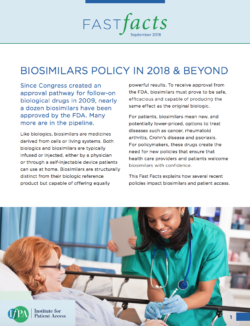Fast Facts: Biosimilars Policy in 2018 & Beyond
September 12, 2018
 Since Congress created an approval pathway for follow-on biological drugs in 2009, nearly a dozen biosimilars have been approved by the FDA. Many more are in the pipeline.
Since Congress created an approval pathway for follow-on biological drugs in 2009, nearly a dozen biosimilars have been approved by the FDA. Many more are in the pipeline.
Like biologics, biosimilars are medicines derived from cells or living systems. Both biologics and biosimilars are typically infused or injected, either by a physician or through a self-injectable device patients can use at home. Biosimilars are structurally distinct from their biologic reference product but capable of offering equally powerful results. To receive approval from the FDA, biosimilars must prove to be safe, efficacious and capable of producing the same effect as the original biologic.
For patients, biosimilars mean new, and potentially lower-priced, options to treat diseases such as cancer, rheumatoid arthritis, Crohn’s disease and psoriasis. For policymakers, these drugs create the need for new policies that ensure that health care providers and patients welcome biosimilars with confidence. This Fast Facts explains how several recent policies impact biosimilars and patient access.
Tags: Biologics, RespiratoryCategorized in: Fast Facts, Policy Papers

